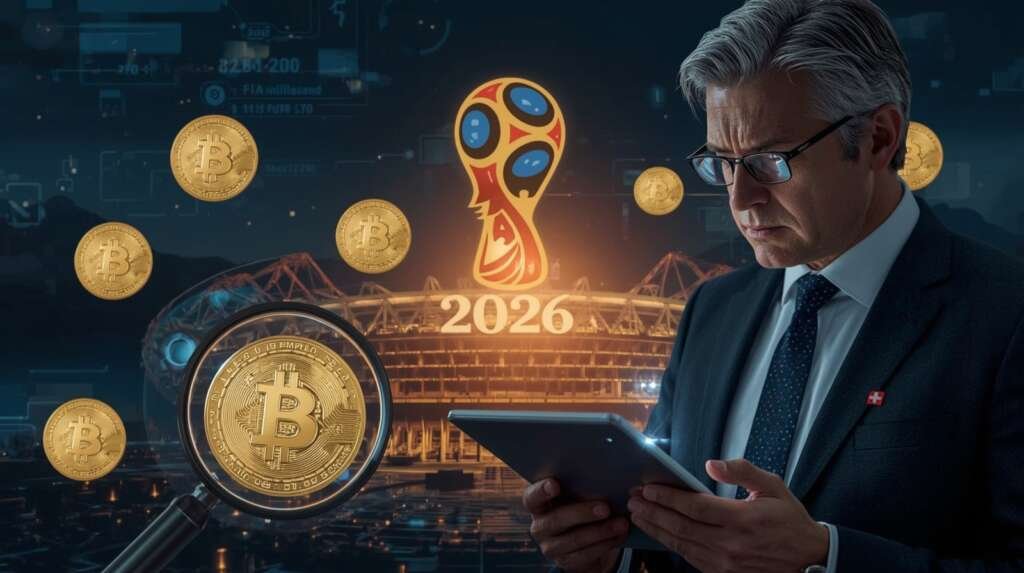Fédération Internationale de Football Association, famously known as FIFA, has found itself in the middle of a regulatory complication. At the beginning of October this year, Switzerland’s gambling regulatory authority Gespa confirmed that it has begun a preliminary review into FIFA’s sales of “Right to Buy” (RTB) tokens associated with the 2026 FIFA World Cup. These blockchain-based tokens don’t instantly grant you a seat for the matches, but instead, they present a reserved window in which the holders can buy tickets later. However, certain conditions need to be met to obtain this perk. The investigation does not allege any foul play at the moment, but this conditional access through crypto-like tokens is looking a lot like gambling.
Beginning of the End? – The Preliminary Probe
The Swiss Gambling Supervisory Authority, known as Gespa oversees lotteries, sports betting and other large-scale games. They decided to initiate a fact-finding review to determine whether FIFA’s RTB tokens fall within the ambit of Switzerland’s gambling regulations. Notably, Gespa’s top officials have emphasized in their statements that no misconduct has been alleged. The regulator is only examining whether the tokens constitute unauthorized lottery and/or sports betting under Swiss law. That is precisely the type of threshold inquiry that Gespa is uniquely authorized to pursue.
Several news outlets reporting the development focus on the token structure, i.e., whether outcomes are dependent on team performance or other conditions, might invoke the legal definitions that determine gambling in Switzerland. As the regulator stated, it is collecting facts and determining the legal nature of the offer found at collect.fifa.com.
What are FIFA’s Right-to-Buy (RTB) Tokens?
RTB tokens are digital assets that are issued on FIFA’s own blockchain-based platform, FIFA Collect. These tokens are not tickets. Instead, they ensure a capacity to buy tickets within a certain time period, or designated window. This window is for certain matches or match packages (as defined by your token), for which the owner of the token can buy tickets for face value when FIFA opens the window. The price of the RTB token does not include the price of the ticket itself. This and other mechanics are captured in FIFA’s own explainer pages, FIFA Collect.
There are different kinds of RTB tokens:
Team-linked RTB tokens, such as a “Right to Final” for a particular country, will only activate if that team has qualified to the stage (i.e., your country’s team reaches the final). If the team does not qualify, your RTB could remain dormant until it expires, and you will not be given a chance to buy that ticket.
Packaged or “glory” products are special “drops” that include access to an RTB for knockout games. For example, in October on FIFA Collect, there was a pack called “Road to Final Glory – Double Edition” which was available for a price of US$1,499. That pack included two RTBs (each one was a right to one ticket) to a knockout game, with the exact game revealed at the time of pack opening.
RTBs can also be resold on FIFA’s own marketplace (which leverages technology from its partner Modex). In fact, the marketplace provides examples of the premium price popular RTBs can reach. For example, some multi-game RTB collectibles have been listed with five-figure asking prices in USD on the marketplace interface.
To sum it up, FIFA is selling access to the opportunity to buy, not seats. Fans are now paying for a conditional right to access future tickets that they can buy.
What is the Interest of a Gambling Regulator?
In Switzerland, Gespa regulates lotteries, sports betting, and large-scale skill-based games. The Federal Act on Gambling (also called the Money Gaming Act, effective from 2019), aims to ensure that gambling is safe and is done with social responsibility. As per Gespa’s mandate, it will regulate gray and illegal activities. Quotes from legal references and Gespa’s own website summarize the following: the authority is responsible for determining whether a chance-based product that provides a potential benefit for a stake, traverses the legal lines of a lottery or a betting product.
This is the crux of the investigation. If the value of an RTB is dependent on the uncertain outcome of a sporting event (for example, your chosen team must qualify), and if a consumer is wagering money for the opportunity to obtain a good at a later point for a limited or scarce good, does that look like a lottery or sports betting based on Swiss definitions? That’s the line to clarify for Gespa. Once again, as stated, this is only a review and not an accusation; it is about classification.
The Technology Stack: FIFA Collect, Modex and Avalanche
FIFA Collect began on Algorand (and some assets on Polygon). However, in 2025, FIFA announced it would migrate to a custom Layer-1 chain built from Avalanche’s AvaCloud services. By the end of summer 2025, FIFA was communicating to users that FIFA Collect has “officially moved to the FIFA Blockchain,” which is a dedicated, EVM-compatible chain to support better performance and wallet compatibility. Avalanche’s blog and FIFA’s website both confirm the move, with FAQs dated for that migration providing timelines and user actions in May/June 2025.
Tidbits from the media caught the same evolution. Avalanche was chosen for scalability and control, and Modex remained a platform partner to run FIFA Collect without skipping a beat. The key point for regulators is not so much the chain itself, but the consumer-facing product that has been built on it. Still, the migration demonstrates FIFA’s desire to leverage Web3 core infrastructure as part of ticket-adjacent experiences for one of the biggest sporting events in the world.
How Big is the RTB Market So Far?
Marketplace analytics and reporting offer an indication that “tens of thousands” have sold and revenues have eclipsed eight figures, including a frequently referenced $15 million+ indicator of direct sales volume before general ticketing for 2026. As reported by The Athletic, summarized by Sports Business Journal and reflected in subsequent coverage, over 30,000 RTBs had been sold. Profits linked to RTBs “almost certainly exceed $15 million” as of September 2025. Reporting by Bloomberg, along with various industry write-ups, has also tracked in the same general vicinity of estimates.
These numbers are interesting not because the total World Cup revenue reported by FIFA has moved the needle (ticketing is expected to be measured in billions) but because they demonstrate that tokenized access can be monetized before ticket sales. This is a new line of revenue and a proof-of-concept by which governing bodies of sport can see how far they can sell scarcity and priority rather than the ticket itself.
Reasons Behind the Division Among Fans
FIFA claims that the RTB products offer a solution to the very real issue of overwhelming demand. For instance, at Qatar 2022, there were approximately 3.4 million tickets available for 23 million requests, a ratio of nearly 7 to 1. FIFA’s explanations for RTBs emphasize that they would allow participants to bypass lotteries in favor of a predictable product access, at least for a fixed allocation of tickets; rather than the “submit and pray” option of traditional lottery-based distributions.
However, many fans see it differently. The same ticket that they are purchasing for the face value can also be secured via tokenized rights for what is essentially a refundable fee. And there’s no understanding of whether some rights will become active (e.g., team-dependent RTBs). The whole endeavour has thus provoked a steady wave of confusion and criticism among the fan community.
Within FIFA’s ticketing marketplace, RTBs are explicitly noted as transferable and resellable. For some individual listings, they appear at very high prices, which reinforces the idea that scarcity has already been turned to profit prior to issuing a ticket.
The annoyance also intersects with a different controversy: 2026 ticket prices. FIFA has argued that ticket prices will be variable and correspond to demand, indicating that entry-level group-stage tickets will start at around $60. But critics have noted that entry-level seats are limited, and the final ticket prices could be the highest ever for the World Cup. News organizations have reported on pushback from fan groups, highlighting that prices for the cheapest final tickets would be over $2,000. They’ve called the global ticketing model “astounding.” This global context is impacting how fans perceive RTBs: as a further fee in a challenging affordability period.
The Legal Question: When is a Token Equivalent to a Lottery?
Swiss law does draw a distinction between casino gaming (federal jurisdiction) and the lotteries/sports-betting skill games area of authority that is regulated by Gespa. The Gambling Act (2019) gives regulators the authority to deal with any large-scale “money game”. It includes games where a stake is required, and a benefit is contingent on luck or chance, in the same way as a licensed game offering/providing consumer protection, or to deny access or offer any non-wager-based benefit that is premised on chance. Similarly, Gespa itself in its literature describes lotteries as games based on unpredictable events and draws of chance, where there are no limitations or predetermined limits to participants.
Where does an RTB fit in?
- If you pay for an RTB now for a chance to purchase scarce goods in the future, and whether you get to purchase the goods depends on chance and/or random selection (a draw, team performance), Gespa may think of this as “lottery-like.”
- On the flip side, if an RTB just gives priority access to a limited quantity in an inventory, it may be more of a conditional purchase right or the privilege to queue, a commercial device and not a wager.
Why Switzerland and Why Now?
FIFA is based in Zurich, which puts its ticketing-adjacent innovations under the microscope of Swiss regulators. Gespa’s jurisdiction is not limited to casinos. It expressly covers lotteries and sports betting, and they have discretionary authority to examine new digital products provided they appear to contain statutory benefit-for-chance elements. The timing also feels right. The Right-to-Buy program has scaled meaningfully in 2024–2025, prior to the World Cup, and ticket pricing for 2026 has spawned a veritable public discourse alight with spirited opinions. That creates the urgency of regulatory certainty before disputes and a lack of clarity become a reality.
How This Fits a Broader Ecosystem: Sports Meets Web3 Meets Regulation
Sports organizations globally are experimenting with Web3- from NFT collectibles and fantasy gaming to token-gated experiences. FIFA’s initiative is one of the boldest so far. It’s not just selling some digital collectibles but using tokens to mediate real-world access to the world’s most coveted football event.
On the tech-facilitator side, FIFA’s Avalanche-based chain is a demonstration of how major brands are adopting sovereign blockchains to manage scale, fees and user experience whilst retaining control. On the business opportunity side, it also demonstrates how organizations can profit from a combination of anticipation and scarcity- selling the queue rather than the seat. On the regulatory front, it requires a re-ask of those same questions, albeit with a more modern trigger. If it looks like a lottery and quacks like a bet, does the label of token matter less than the economic reality?
The Swiss system is an especially interesting test bed because Gespa’s remit also covers lotteries and sports betting at scale. It is explicitly consumer protective in nature. Should Switzerland take a position here, it may serve as a guide for other regulators.
Helpful Tips for Fans Considering RTBs
While Gespa is considering its review, the rules remain the same. RTBs can be purchased and traded on FIFA Collect, and they serve the purpose that FIFA describes. If you are thinking about a purchase, the following is a quick due diligence checklist based on the official materials:
Understand what you are buying
An RTB is not a ticket; it only serves to reserve a purchase opportunity for you. You will still pay full price for the ticket when it comes time to buy (prices may vary). FIFA explains this directly in their explainer pages.
Consider whether there are any conditions
In cases where the RTB is linked to a team, the RTB may never even be activated if your team doesn’t reach the stage relevant to receiving the RTB. For package RTBs, the information will be revealed to you only after you purchase/open the package. If the unknown is what draws you to this, then that’s great. You just need to acknowledge that fact.
Check your timeframes and redemption window
The RTB must be redeemed within the timeframes announced by the FIFA Collect. If you miss the window, you will lose the opportunity to redeem the RTB.
Consider the secondary market carefully
The mere presence of a high listing does not mean it will sell for that amount. Check for liquidity and be wary of paying exorbitant markups. While FIFA Collect confirms you can trade, this does not guarantee you will be able to find a buyer.
Will RTBs Change the Ticket Business, or Will They Be Curbed?
Whether RTBs are a watershed or a one-off will depend on the response from regulators and fans alike. If Gespa determines that the model is simply an approved model that falls outside of gambling law, expect multiple sports bodies to look at offering tokenized access. If Gespa appears to be gravitating toward opening structures requiring a license to the consumer market or determines that the RTBs in question are lottery-like, that may limit or change how the rights are marketed to Swiss residents.
Either way, this investigation demonstrates an acknowledgment that flat regulations that were written for roulette and raffle systems are being applied to digital scarcity and digital queues. Issuers need to approach the consumer market with a level of thinking that treats them as more compliance officers and less product managers.
The Wider Market Indicator
Regardless of the outcome in Switzerland, there are two key things we can already figure out from these initiatives:
Tokenizing access has genuine commercial potential. It enables event owners to sell certainty in the context of ticket scarcity and provides up-front cash flow. The formula will resonate with the kind of high-profile sports and entertainment brands we see across global media outlets. The early revenue figures generated at scale for FIFA and others certainly show the potential.
Interpretation of regulatory standards will differ. What is acceptable in one jurisdiction may not cross the line in another. We are finding that every token attached to tickets – many of which link to performance or outcomes is increasingly being interpreted through the lenses of gambling and consumer-protection regimes in the jurisdictions under scrutiny.
The time is right for clarity. If we know clearer terms, transparent conditions, and strong consumer protections, it will help to make sure that a focus on innovation in access does not segway into gambling.




